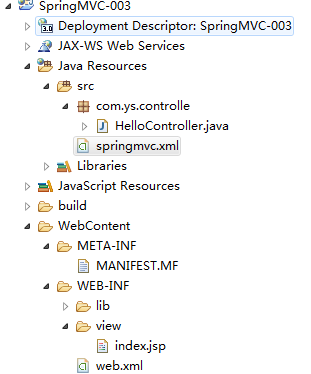SpringMVC应用------基于注解的入门实例
前两篇博客我们讲解了基于XML 的入门实例,以及SpringMVC运行的详细流程。但是我们发现基于 XML 的配置还是比较麻烦的,而且,每个 Handler 类只能有一个方法,在实际开发中肯定是不可能这样来进行开发的。那么这篇博客我们就讲解实际开发中用的最多的基于注解配置的SpringMVC配置。
项目结构为:

1、在 web.xml 文件中配置前端处理器
<?xml version="1.0" encoding="UTF-8"?> <web-app xmlns:xsi="http://www.w3.org/2001/XMLSchema-instance" xmlns="http://java.sun.com/xml/ns/javaee" xsi:schemaLocation="http://java.sun.com/xml/ns/javaee http://java.sun.com/xml/ns/javaee/web-app_3_0.xsd" id="WebApp_ID" version="3.0"> <display-name>SpringMVC_01</display-name> <!-- 配置前端控制器DispatcherServlet --> <servlet> <servlet-name>springmvc</servlet-name> <servlet-class>org.springframework.web.servlet.DispatcherServlet</servlet-class> <!--springmvc.xml 是自己创建的SpringMVC全局配置文件,用contextConfigLocation作为参数名来加载 如果不配置 contextConfigLocation,那么默认加载的是/WEB-INF/servlet名称-servlet.xml,在这里也就是 springmvc-servlet.xml --> <init-param> <param-name>contextConfigLocation</param-name> <param-value>classpath:springmvc.xml</param-value> </init-param> </servlet> <servlet-mapping> <servlet-name>springmvc</servlet-name> <!--第一种配置:*.do,还可以写*.action等等,表示以.do结尾的或者以.action结尾的URL都由前端控制器DispatcherServlet来解析 第二种配置:/,所有访问的 URL 都由DispatcherServlet来解析,但是这里最好配置静态文件不由DispatcherServlet来解析 错误配置:/*,注意这里是不能这样配置的,应为如果这样写,最后转发到 jsp 页面的时候,仍然会由DispatcherServlet进行解析, 而这时候会找不到对应的Handler,从而报错!!! --> <url-pattern>/</url-pattern> </servlet-mapping> </web-app>
2、在 springmvc.xml 文件中配置处理器映射器,处理器适配器,视图解析器
<?xml version="1.0" encoding="UTF-8"?> <beans xmlns="http://www.springframework.org/schema/beans" xmlns:xsi="http://www.w3.org/2001/XMLSchema-instance" xmlns:mvc="http://www.springframework.org/schema/mvc" xmlns:context="http://www.springframework.org/schema/context" xmlns:aop="http://www.springframework.org/schema/aop" xmlns:tx="http://www.springframework.org/schema/tx" xsi:schemaLocation="http://www.springframework.org/schema/beans http://www.springframework.org/schema/beans/spring-beans-4.2.xsd http://www.springframework.org/schema/mvc http://www.springframework.org/schema/mvc/spring-mvc-4.2.xsd http://www.springframework.org/schema/context http://www.springframework.org/schema/context/spring-context.xsd http://www.springframework.org/schema/aop http://www.springframework.org/schema/aop/spring-aop-4.2.xsd http://www.springframework.org/schema/tx http://www.springframework.org/schema/tx/spring-tx.xsd"> <!--注解处理器映射器 --> <bean class="org.springframework.web.servlet.mvc.method.annotation.RequestMappingHandlerMapping"></bean> <!--注解处理器适配器 --> <bean class="org.springframework.web.servlet.mvc.method.annotation.RequestMappingHandlerAdapter"></bean> <!--使用mvc:annotation-driven可以代替上面的映射器和适配器 这里面会默认加载很多参数绑定方法,比如json转换解析器就默认加载,所以优先使用下面的配置 --> <!-- <mvc:annotation-driven></mvc:annotation-driven> --> <!--单个配置Handler --> <!-- <bean class="com.ys.controller.HelloController"></bean> --> <!--批量配置Handler,指定扫描的包全称 --> <context:component-scan base-package="com.ys.controller"></context:component-scan> <!--配置视图解析器 --> <bean class="org.springframework.web.servlet.view.InternalResourceViewResolver"> <!-- 返回视图页面的前缀 --> <property name="prefix" value="/WEB-INF/view/"></property> <!-- 返回页面的后缀 --> <property name="suffix" value=".jsp"></property> </bean> </beans>
3、编写 Handler
package com.ys.controller; import org.springframework.stereotype.Controller; import org.springframework.web.bind.annotation.RequestMapping; import org.springframework.web.servlet.ModelAndView;
//注意@Controller注解和@RequestMapping注解的用法 //使用@Controller注解表示这个类是一个Handler @Controller public class HelloController { //@RequestMapping注解括号里面的表示访问的URL @RequestMapping("hello") public ModelAndView hello(){ ModelAndView modelView = new ModelAndView(); //类似于 request.setAttribute() modelView.addObject("name","张三"); //配置返回的视图名,由于我们在springmvc.xml中配置了前缀和后缀,这里直接写视图名就好 modelView.setViewName("index"); //modelView.setViewName("/WEB-INF/view/index.jsp"); return modelView; } }
4、编写 视图 index.jsp
<%@ page language="java" contentType="text/html; charset=UTF-8" pageEncoding="UTF-8"%> <!DOCTYPE html PUBLIC "-//W3C//DTD HTML 4.01 Transitional//EN" "http://www.w3.org/TR/html4/loose.dtd"> <html> <head> <meta http-equiv="Content-Type" content="text/html; charset=UTF-8"> <title>Insert title here</title> </head> <body> hello:${name} </body> </html>